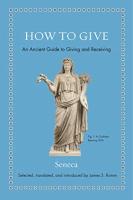
Princeton (2020) h/b 288pp £13.99 (ISBN 9780691192093)
Your sister sends you a garish tie as a Christmas present. You know, because she has told you that it was a present to her husband from someone but he had refused to wear it. How do you frame your note of thanks? A friend is very good to you when you are ill. He asks you to write a reference for him for a position for which you consider him totally unsuited. The local Scout troop appeals for £500 for essential equipment. You write a cheque for the whole amount and ask the treasurer to keep your gift anonymous. He agrees, but you soon find rumours circulating, which he makes no attempt to challenge, that the treasurer paid for the equipment out of his own pocket. What, if anything, should you do?
These scenarios (and cointless others could be imagined) show in how many areas of life a whole range of questions and dilemmas arise around the subject of generosity, obligation and compromise. The ancients were very aware of these issues, especially in Roman society where patronage and clientship were so central, and none more so than Seneca, who addressed them at length in his extended essay de beneficiis and a number of his epistles. The whole subject is therefore a prime candidate for Princeton’s excellent series ‘Ancient Wisdom for Modern Readers’, in which classic texts in their original Latin or Greek with a parallel English translation seek not only to inform the reader what can be learnt about the ancient writers’ views, but also what can be learnt from them to guide our behaviour today.
In this case the task has been undertaken by James S. Romm, Professor of Classics at Bard College, New York. R has already contributed two well-received volumes to this series: How to Die, based on selected letters of Seneca, and How to keep your Cool, based on Seneca’s de ira. In taking on de beneficiis R, has faced a formidable challenge. Not only is it, as he notes in his introduction, the longest of S.’s extant essays (and therefore within the parameters of the series requires extensive selection from a wealth of material), but it deals with a number of different contexts which makes it less focussed than some other topics which S. has addressed. Indeed it is R.’s view that S. was still exploring and elaborating his ideas in his Moral Epistles and so he concludes this book with extracts from Epistle 81.
As in his previous offerings, R. is very helpful in his introduction and in the passages, printed in italics, by which he links the various extracts which he has selected for inclusion in the main text. R’s short summations show a clear mastery of his material. For example, he sums up the opening passages by describing them as ‘a loose collection of introductory thoughts, many of which touch on S.’s central themes: giving is not like lending, since no return should be expected or demanded; gratitude is essential but ingratitude should be pardoned; intention and attitude are central aspects of generosity; we should emulate the gods in our open-handedness’. And further on in the text, R. summarizes the selected passage which follows: ‘S.’s ethical code demands that the giver abandons all thought of gain … any public acknowledgement of the gift.’ S. would greatly approve the custom of modern-day philanthropists, who have their gifts attributed to ‘anonymous’. In these and similar ‘guide-posts’ R. makes a valiant effort to keep the reader on track in what is often S.’s complicated exposition of his ideas.
At the end of the book R. offers a set of notes which attempt to explain some of S.’s arguments, on occasion acknowledging that ‘S.’s train of thought is difficult but it amounts to this …’. If some passages require re-reading, perhaps several times, to unravel S.’s arguments, the fault does not lie with R. or with Princeton, to whom we should be grateful for not ducking a topic with so many ramifications for our daily lives.
Ray Morris
